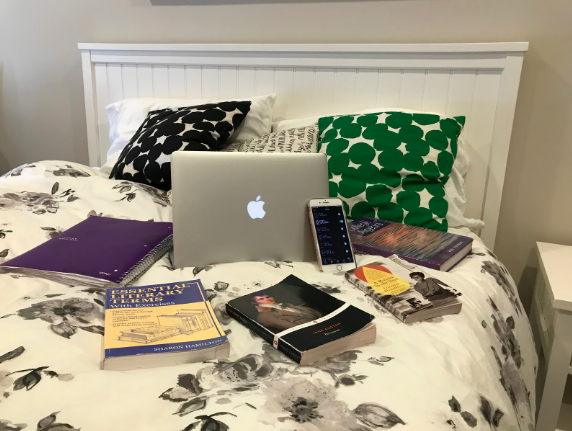Sleep Deprivation in Teenagers

Pictured above is an assembly of common distractions that disrupt Xavier student’s sleeping schedules. This consists of technology and homework. Photo courtesy of Lily Tierney ’19.
Sleep deprivation is a serious problem that is seen amongst many teens nowadays. According to Nationwide Children’s, on average, a teenager needs 9 to 9 ½ hours of sleep a night, but are only getting between 7 to 7 ¼ hours of sleep. Senior Brisa Footit stated, “On average I get around 7 hours of sleep during the week and on the weekends I get about 8-9 hours.” Sleep deprivation is an easily curable problem, but the problem still continues to persist. Sleep is vital to each and every person’s well being and is why it is so important to get the right amount of sleep.
Adolescents lack sleep for numerous reasons, but a few main causes are their shift in sleep schedule, how early high schools start, school and social obligations as well as the irregular sleep patterns teens have developed.
When it comes to irregular sleep patterns, most teens tend to go to bed late during the week and wake up early for school. Footit expressed, “I do feel like I suffer from sleep deprivation during the week because I work everyday and sometimes I don’t have time to finish all my homework and I go to bed really late.” Irregular sleep problems are not only because of particular school obligations like work or school, but technology societal expectations play a role as well. When teens are starting to develop, they experience hormonal changes along with changes in the production of melatonin. Melatonin is the sleep hormone that regulates a person’s sleep-wake cycles. It is typical for adolescents to go to bed later than most people because of the change in their sleep schedule. As a result, teens experience a 2 hour biological sleep shift, which means they go to bed two hours later than they used to, and they also wake up two hours later than normal. Along with biological factors, high schools start way too early, which messes up a teens sleep schedule even more. According to the National Center for Education Statistics, the average high school opens at 7:59 AM everyday. If students are staying up late finishing homework and completing other obligations, then have to wake up early for school, when do teens get the sleep their body needs?
Adolescents tend to oversleep on the weekends to make up for the sleep they lost during the week, but this only messes up their sleep schedule even more. According to Dennis Rosen, an Assistant Professor of Pediatrics at Harvard Medical School, sleeping in on the weekend to fill the deficit allows a teen’s internal clock to stray away further from their external clock. This means that the sleep shift will worsen and teens will go to bed even later during the week. Due to falling asleep even later during the week, a teens circadian rhythm will be botched, and it will be harder to wake up for school in the mornings. Senior Tessa Tierney stated, “On average I get between 8-9 hours of sleep during the week, and on the weekend I try to get more sleep probably between 9-10 hours.”
There are many consequences that come with sleep deprivation in teenagers. According to the Child Mind Institute, not getting enough sleep limits one’s abilities to learn, listen and focus during school. Forgetting important information also comes with sleep deprivation, and students tend to do worse in school. As reported by the Georgetown Behavioral Health Institute, sleep deprivation also makes one more prone to acne and skin problems, and it also causes teens to eat too much. When teens are behind on sleep, it can cause weight gain because they start to eat unhealthy foods, and it can also causes teens to start drinking more caffeine and using nicotine. Being deprived of sleep also causes teens to develop aggressive and inappropriate behavior, such as yelling at others and being impatient. Other behaviors due to sleep deprivation are things such as depression. According to the Journal of Youth and Adolescence, each hour of sleep that a teenger loses is associated with a 38% increase in the risk of feeling sad or hopeless, along with a 58% increase in suicide attempts.
According to Sleep Education for School, one of the biggest consequences that comes with sleep deprivation is driving drowsy. There are numerous accidents each year that comes with drowsy drivers. As stated by Better Health sleep deprivation also causes teens to be more prone to illnesses, and they get sick easier and more often. Teens tend to be more irritable and engage in risky behavior. Overall, being sleep deprived impacts teens in many ways.
Learning how to make sleep a priority is important for teenagers to do from a young age. For example, teens should learn how to wake up around the same time each morning. Establishing a set time to wake up everyday regulates sleep patterns, resulting in feeling less tired and allowing the body to sync with its natural patterns, making it easier to fall asleep. Tierney voiced, “I can help myself get more sleep by going to sleep earlier.” Another important factor that ensures good and healthy sleep is completing physical activities each day. Working out is essential to having a healthy life, and it will also help contribute with good sleep.
Another essential factor that contributes to good sleep is not watching TV or using technology in the hour before sleep. According to Pediatrics, teenage sleep has declined over the last 20 years. According to Sleep by the National Sleep Foundation, sleep decline has increased over the years due to phones and social media. Not only is it the popular apps known as Twitter, Snapchat, Instagram, and Facebook, but is is the light that comes off of teen’s cell phones. Phones emit a light called blue light, and this causes teens to not feel tired because it is suppresses the secretion of melatonin, the sleep hormone. When teens stay up late on their phones and computers, it stimulates their brain, causing them to fall asleep later.
Also, avoiding caffeine in the hours before one goes to sleep is essential. Caffeine is a stimulant that causes delayed bedtime. Winding down and relaxing before sleep helps one have a better nights sleep. Procrastination will keep teens up later, so making sure a teen gets their activities and obligations done at a reasonable time is key. Senior Makynlee Schmidt stated, “I can get more sleep by planning my things I have to do throughout the day and making sure I have those things accomplished by 8 pm.” Keeping one’s room dark, quiet, and cool can help when it comes to sleeping at night. Allowing a little light in the morning such as opening a window will signal to the body that it needs to wake up. Developing signals to teach the body that it is near bedtime is important because the body will start to wind down and prepare for bed Activities such as reading a book or taking a shower are good signals.
Sleep deprivation is a serious issue that needs to be addressed and fixed, and parents need to be informed on this issue before it is too late. There are many negative factors associated with sleep deprivation, but it can be prevented.



